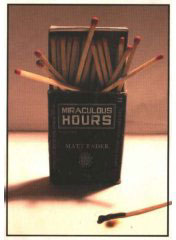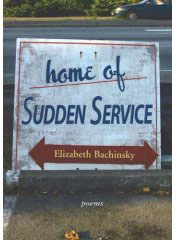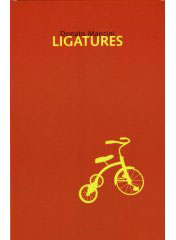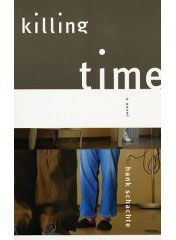Miraculous Hours

by Matt Rader
80 pages,
ISBN: 0889712018
Home of Sudden Service

by Elizabeth Bachinsky
78 pages,
ISBN: 0889712123
Ligatures

by Donato Mancini
102 pages,
ISBN: 1554200172
Killing Time

by Hank Schacte
144 pages,
ISBN: 1554200199
A Small Dog Barking

by Robert Strandquist
160 pages,
ISBN: 1895636698
Post Your Opinion | | Introducing Five New Vancouver Writers
by Lyle Neff
Some four centuries after warlike and fur-trading Europeans first contacted the warlike and grease-trading tribes of the area, the enormous Canadian province of British Columbia remains, in the literary sense, strikingly underwritten. BC, and particularly its vast muddy port Vancouver, have survived the province's lack of key fiction and poems for a long time, and it's a happy and prosperous, perhaps even post-literary, zone today: a booming brokerage space between Ontarian, Californian, and Asian media empires. You can scarcely find a Lower Mainland pencil-pusher these days who doesn't aim to write for the movies, for example. And one local weekly's recent headline about architecture in "The World's Youngest City" showed, simultaneously, a very Canadian ignorance of actual history and facts, and a very American/New Chinese longing to rush headlong into a lucrative future. In short, Vancouverite and British Columbian culture has never been ideal ground for the growth of great literature in any recognizable mould. But the province's restless energy has often generated good, and sometime even remarkable writing (bits of Emily Carr; George Bowering; Douglas Coupland; Timothy Taylor and Don Coles, arguably). At the very least, the five writers featured here suggest that Vancouver's status as an amnesiac bartertown of history and geography will continue to give us a trickle of pretty superior readables.
To begin with the strangest of the recent small-press crop, there is the critic and sometime visual artist Donato Mancini. His first book of poems and poem-like things, Ligatures, has a friendly-looking tricycle silhouetted on its cover, portending, you'd hope, the kind of avant-gardeism that doesn't depend for its effects on a degenerate erudition, but rather on an absolutely fresh, even child-like, approach to important questions. It's a pleasure to report that Mancini mostly lives up to his trike, coming off usually like a bright Martian inquiring into this thing humans call language, and only occasionally like a grouchy Marxist who has read 20,000 books and got tenure the year Foucault died.
Mancini's nutty attack, for example, on the "at-sign"¨you know, that circled lower-case "a" in the middle of your email address¨is hard to resist, especially when he crayons a small "z" with a round perimeter on it, and insists that this must mean "zoo". Well, why not? Mancini is a prankster whose typographical insanities and mathematical insults to English aren't just for laughs (he thinks, harder than most lyric poets do, about the relationship of code and abbreviation to humankind's unsymbolic inner nature), but they also aren't for everyone. Ligatures is one of the finer texts to emerge from a decade of intellectually-distinguished and instantly-remaindered experimental Vancouver ferment involving Simon Fraser University's sort-of-English Department, the Western Front artists' collective and the Kootenay School of Writing (the latter entity being the kind to put quote marks round both "school" and "writing"; and to persist in being located nowhere near the Kootenay region). This is not to cut down Mancini's witty and mirthful accomplishment in Ligatures, but to say that it's a rarefied piece of work, a cunning and esoteric thing, built for connoisseurs.
More accessible, and perhaps inevitably less startling, is the young Matt Rader's first collection of poems, Miraculous Hours. A Vancouverite now, Rader grew up in the less-populated regions of southern Vancouver Island, and is at his best when exploring some of the more forgotten edge lands there, where raw nature collides with small-town (and sometimes national-scale) industry and resource extraction, and the artifacts thereof:
Night oozed through the streets and the chain-link
skirt
of the public-works yard, flattered itself
in the owl's pupil, spilled a thousand thousand silent
shrews
onto the forest floor, wretched a muscle of worm
(Context suggests Rader must've meant "retched" there.) This is the real and strange British Columbia, where rough-hewn frontage roads lead to ancient middens, and the fringes of every little town are choked with salal, fireweed, and abandoned logging equipment. Among BC poets, perhaps only John Pass has mapped these out-of-the-way territories to any great extent. Rader casts an uneasy eye on this subject matter, serving up neither an environmentalist's usual stew of rant and lament, nor any condescending canonization of the tough and sometimes wild people who necessarily populate such places:
the old Ford pickup rutting
in the gravel where the road washed out
the previous winter and Pete rolling a joint
in the passenger seat, always so anxious
to meet a bear or cougar, something at least
potentially vicious, out there in the woods
In this macabre poem, "Wolf Lake", probably the best of this short book, the joyriding kids do, indeed, encounter something vicious. But for Miraculous Hours to rise to the level hinted at by his intelligent choice of material Rader would have required a language a bit livelier than what he seems capable of. Rader is somewhat afflicted by calmness, and too often dawdles along with gerunds when a bit more presentness seems required; mostly, as with a lot of tasteful Canadian poets, you wish he would get upset once in a while. One almost-brilliant poem here, "Last Night on Earth", hints at something more eruptive in Rader's talent¨"the stars are tied-off dogs frenzied at their stakes," he writes¨but the piece then promptly vanishes in a cloud of "-ings." Still, probably a good half of Miraculous Hours plays to Rader's strengths: a keen eye for nature's hidden and blind machinations; an abundance of that rare poetic skill, knowing when to stop; and that virtue which matters most in fine poets, an evident but unflamboyant work ethic. Still a couple years shy of thirty, Rader's among the likeliest of his generation to overcome the errors of youth, and craft some of the next decade's really valuable Canadian poetry.
This other apprentice poet, Elizabeth Bachinsky, is a friend and colleague of Rader's, to the degree that, presumably as a salute, she rewrites that unnerving "Wolf Lake" poem of his, in a different voice, early in her second book Home of Sudden Service. Both the Rader poem and its Bachinsky reply are fine pieces, but neither the amity between these writers, nor some superficial likenesses in setting and tone, should obscure the radical differences in what each is trying to achieve. Where Hours is observational and low-key, like say an atlas, Sudden Service is brashly interpretive, aiming to bring together a vast array of ideas and situations between one set of covers: for better or for worse, Bachinsky's aim is more encyclopedic. The A-Z range she aims to incorporate is the whole field of modern female adolescence. While a slim volume of lyric poems is obviously unable to capture every aspect of that giggly yet terrifying phenomenon, it might still draw in and illustrate more of it than any televised video countdown. If it's well done, that is:
Sean and Shaun and Michael, Paul and Steve,
how strange you were, above me ű strange like
thieves
one frightens in a heist. You were just boys
with stars engraved, like names, indelibly
along your boyish veins. You stood out green
under your flesh. You tasted like a choice.
Sean and Shaun and Michael, Paul and Steve
This piece, "For the Punk Rock Boys", showcases Bachinsky's flair for incantation, and crafty understanding of the uses of poetic repetition. More importantly, "Punk Rock Boys" and a handful of other Sudden Service poems move, with efficient artistry, to the centre of femaleness. Not just the addled femininity of youth, either, but into that exclusive XX club wherein members might get pregnant, or fear breast cancer's time bomb, or consider males to be as crucial but inexplicable as weather. "There's no such thing as too much man/ to handle," says one of Bachinsky's knowing yet vulnerable young women, while another says of her paramour, "I like his cruel eyes . . . I like his parents . . . I have to cut his boots off with a knife." One can overstate Bachinsky's power of insight, and certainly in her 20s she's not yet an Old Mistress; some of the pieces here, like "Near Miss", are prose-like, and trudge along in a merely adequate fashion. But the high points here are poetically impressive, and Elizabeth Bachinsky has written an exciting book. You can tell this talent will encompass more of poetry's great themes before long, and do so in an unfussy but emotional Canadian voice.
Over in the fiction realm, Vancouver's Robert Strandquist looks more into masculine emotion, with an application of "lopsided syntax" to the ten tales, most of 'em about irritated men, which make up his third book, the story collection A Small Dog Barking. Strandquist is one of the most gnomic utterers on the West Coast, and can be faulted when one of his characters, for example, grows "a fine hair of fear." Just one? Strandquist belongs to that very modern tribe of short-story writers which is obsessed with creating perfect, thunderous sentences. However, what seems like thunder is sometimes just the sound of an audience scratching their heads: "Slowly he resigned himself to the traumas in the walls and the not insignificant reigns of garbage."; "There it was in all its temporal gore, its abacus nakedness, its funded compromise, its executed relationships."; "I fingered my hat and sleeved off the sweaty sun."
And yet, Strandquist is a mature prose writer, not part of that Ondaatje-Anne Michaels gang which uses "poetical" weapons to mug innocent readers of books where the lines reach the right margin. (To digress further, Grant Buday wrote a useful corrective to that species of text in a recent essay in Sub-Terrain.) The point of Robert Strandquist's writing is, he doesn't just provide sequential tableaux of allegedly delicate and luminous moments, but a good deal of tasty narrative and continuity, containing genuinely flavourful characters. This is particularly true of the book's longish centrepiece, "Hamnet", wherein a pampered jet-setter's journey from peevishness to Shakespearean rage is skilfully depicted. (One especially likes the observation here that "Ophelia's deflowering had become a public property." Exactly.)
The flaw of A Small Dog Barking isn't that Strandquist tries to suture poetry's eye to prose's brain. It's that he puts an over-thought abundance of words into the mouths of his restless, seething male protagonists, which too often tangles up both the writing and the reading. (The book's summarizer, on the back cover, seems to share this carelessness, calling the stories' motif "riparian". Huh. Not much about rivers in the book itself. There is a fairly cool bit about a small-town drowning in the first story, "Dryer Sheets". Perhaps Strandquist's anonymous blurber meant to use a word that sounds equally mysterious: "limnological", or "lake-oriented".) Joking and context-free quotes aside, Small Dog has got a certain style, and I found myself surprised when I read hungrily to the end of it, and willingly re-read the parts that had to be read twice. One great reward of this was some of the most caustic Trans-Canada traveling-band storytelling this side of Hard Core Logo; another was an appreciation for the mutinous, crammed-with-meaning sensibility Strandquist brings to the art of fiction.
With Hank Schacte's first novel, the amnesiac opus Killing Time, you have to appreciate that the question of memory is in the Western cultural spotlight right now. Certainly this slippery theme is much-discussed in print recently, but it's really in fin-de-siecle film that memory's architecture is being considered. Schacte, an American on Saturna, may or may not have seen Eternal Sunshine of the Spotless Mind, Minority Report, The Bourne Identity, A.I., The Manchurian Candidate or that first Matrix flick where 'dTja vu' means they've changed something. But his publisher's rep did say of Killing Time, "We're comparing it to Memento."
While that might be a very fine movie, the closest filmic equivalent to Schacte's book I'm aware of is the lovingly handcrafted time-machine thriller, Primer. This novel shares with Primer an evocation of events sliding quietly out of control, chronologically and otherwise, and that is a compliment indeed.
The question of whether Schacte's novel is film-esque is not strictly relevant (although the author has apparently written for the screen before; and Killing Time is like all movies in its lack of commas.) What Schacte does with these questions of recall and retention ought to work first as literature, obviously, and occasionally does. But much of his intelligent book isn't too memorable. You don't want to blame this on its protagonist Richard, who got head-smacked in a car crash he doesn't recall, and doesn't begin forming new memories until some eight months later. You're inclined to forgive the vagueness of this extremely unreliable narrator, and forgive the animal desire he feels daily for Quebecois Cindy, "in pale silk camisole that glows aquamarine in the moonlight running on lithe legs . . . " Richard's Venus, la Cindy, is girlfriend to his own brother Paul, who has cared for him (poor stunned Richard) in the eight months since the horrific accident; all three have been living together in what appears to be an East VancouverűGulf Islands axis; and so a melodramatic stage is set. You want to read to the final tumult.
On the other hand, the brain-injured repetitiveness and impulsivity on view in Killing Time's 150 pages¨as narrated by a protagonist whose macabre amnesia doesn't seem to faze or frighten him at all, and whose hoboesque wanderings form much of the novel's centre¨can get a little, um, hard to follow. It's not even too clear, at the end, whether Richard, memory's low-key casualty, actually gets the girl or not:
"Making love" he said. "Or was it fucking?"
"Oh Richard don't do this don't do this to me. Don't start remembering now" [Cindy] said starting the car to drive blindly ahead through tears . . .
Killing Time has a rough-hewn feel to it, and while not being especially readable, does smuggle many gigantic ideas into its quietly-poetic plot. Hank Schacte deserves credit for his textual accomplishment here, and should get double credit if he doesn't try to turn this novel into a slow, talky movie, as many 21st-century BC writers would otherwise do. ˛
Lyle Neff's most recent book is Bizarre Winery Tragedy (Anvil, 2005). He lives in Vancouver.
|